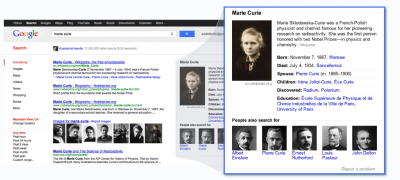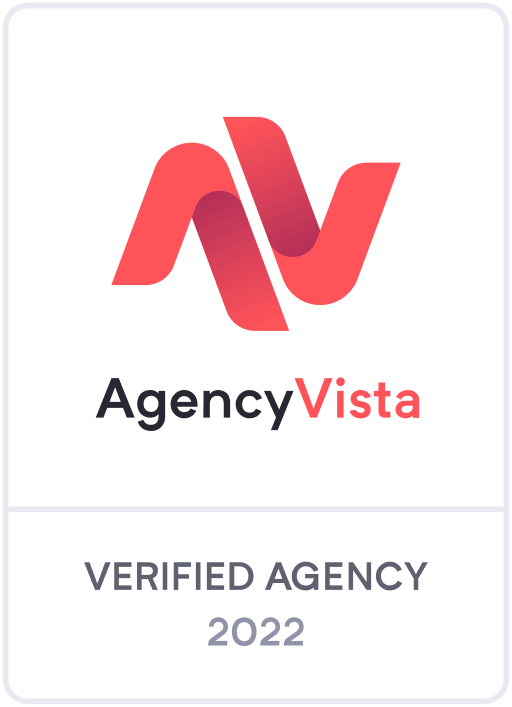At it’s core, search is and always has been about discovery. A basic human need to expand the mind. However, searching still requires a lot of hard work. Until now. Yesterday, Google launched it’s long-talked-about semantic web, aptly called “Knowledge Graph”which will help you discover new information quickly and easily. Starting now, Google is rolling Knowledge Graph out across all Google search tools and our most fundamental online task may never be the same again.
 Since the beginning of the internet, search has essentially been about matching keywords to queries. Take for example, {Michelangelo}. To a search engine, it’s just a word. But we know that Michelangelo has a much more important meaning than just being a word or a name. To us, it may be the Sistine Chapel, Pietà, David, or an Italian Renaissance sculptor. Google has been working to understand the relationship words have. An intelligent model or “graph” that can understand real world things and their relationship to one another.
Since the beginning of the internet, search has essentially been about matching keywords to queries. Take for example, {Michelangelo}. To a search engine, it’s just a word. But we know that Michelangelo has a much more important meaning than just being a word or a name. To us, it may be the Sistine Chapel, Pietà, David, or an Italian Renaissance sculptor. Google has been working to understand the relationship words have. An intelligent model or “graph” that can understand real world things and their relationship to one another.
According to Amit Singhal, SVP, Engineering at Google, “The Knowledge Graph enables you to search for things, people or places that Google knows about—landmarks, celebrities, cities, sports teams, buildings, geographical features, movies, celestial objects, works of art and more—and instantly get information that’s relevant to your query. This is a critical first step towards building the next generation of search, which taps into the collective intelligence of the web and understands the world a bit more like people do.”
Social Search
If you haven’t noticed, Google has already made changes to include added other tweaks such as increasing visibility and ranking for content that is more recent and this puts fresh unique content right in the frame. Just take a look down the left hand side in a Google search and you will notice images, videos, realtime, discussions and blogs among other choices. These include things like Flickr, YouTube, Twitter, forums and blog postings. The knowledge graph takes into account the fact that when you search for a phrase, you are not just searching for a combination of words but you are searching for things – people, landmarks, celebrities, cities, sports teams, buildings, geographical features, movies, celestial objects, works of art, etc. By focusing on “things rather than strings”, Google hopes to help you find the information you need more quickly. By using the collective intelligence of the web the search engine can begin to understand the world a bit more like people do.
Impact on SEO
SEO is already difficult enough for small and medium sized businesses to figure out and get a good handle on. Google has made further changes to their search algorithm, since the recent updates of Panda and Penguin, that will have an interesting and unpredictable impact on the world of SEO. Panda and Penguin targeted sites with “thin” content and sites that are over-optimized for SEO. This mainly affected the content farms, the sites that violate copyrights, and the sites that still believe more keywords means more traffic (keyword stuffing). One thing is for certain, if it impacts SEO, it impacts business. So, how will Knowledge Graph change how people perform SEO? In plain terms, I don’t know. I’m fairly confident, however, that if Knowledge Graph was going to harm businesses, Google would have made some statement on it. I would guess that Knowledge Graph works to further solidify statements Google has already made surrounding Panda and Penguin. Write for Humans, not search engines. One of my favorite Matt Cutts video posts was one where Matt answered a question about how to best go about optimizing your website. In simple terms, Matt said make sure you are writing compelling, comprehensive content for your customer and Google will find you. Not only do humans want the whole story, but the Knowledge Graph will likely seek out content that covers all of the facts and their relationship to each other and that is useful to humans in their quest for relevant information. So if you’re writing good content and you’re a legitimate search engine optimizer, Knowledge Graph should be in your favor.
To compete, your plan should be to create great quality content online. At the end of the day, you want to be aware of the games that the search engine algorithms play, but it is still people who are your customers. Plus, Google’s updates to their algorithm have been to focus their SERPs on quality, original content. There may be tweaks to how and where you use keywords. However, continue to stay focused on the value you create for your target audience so they will become loyal customers and want to share what you have to offer with the people that they know.
What Else Can Small Businesses Learn From Knowledge Graph
While I am sure there will be much speculation and debate about how all of this will effect SEO, I think the real lesson is Google’s focus on continually improving the experience of their customers. For their search engine, this means helping you find what you are looking for as quickly and easily as possible. Are you continually looking for ways to help your customers solve the problems that you help them with faster and easier?
One of the features of Knowledge Graph is a system that asks the user what they actually meant by their seemingly ambiguous search.
Sometimes we can get bogged down in all of the different and complicated ways we can solve a question when all we really need to do is ask questions. Small business owners don’t need a team of Google engineers to build feedback mechanisms to help them improve their products and services. Take a cue from Google and work to ask questions and collect feedback to help you continually improve how you serve your customers.





 8055 E Tufts Ave Ste 240
8055 E Tufts Ave Ste 240




